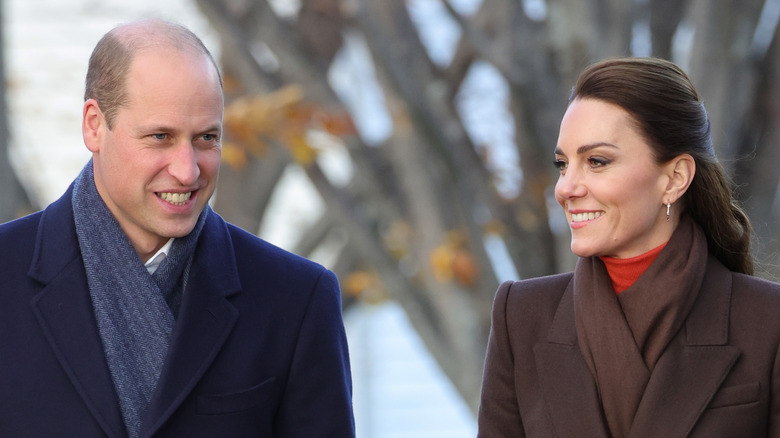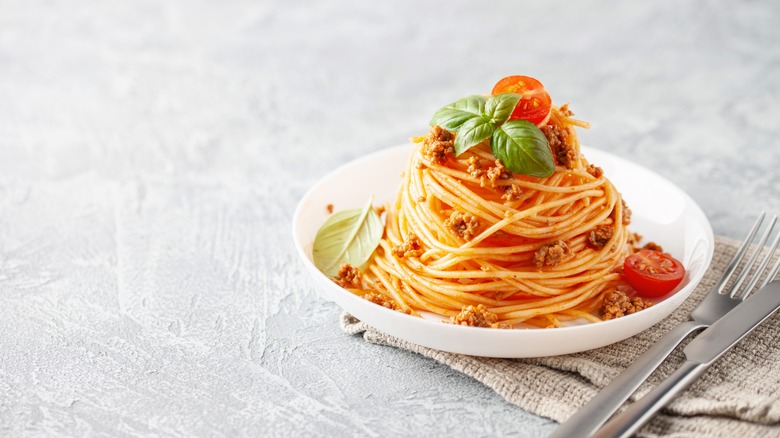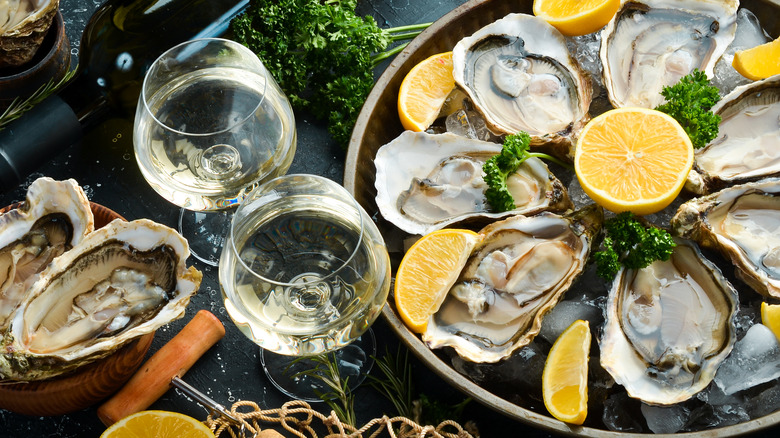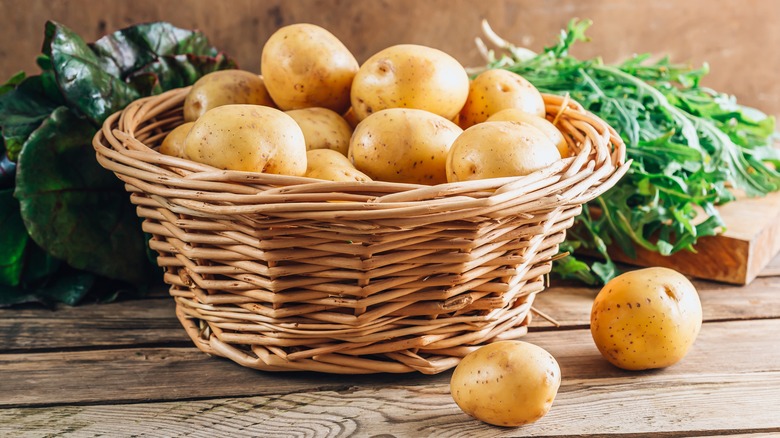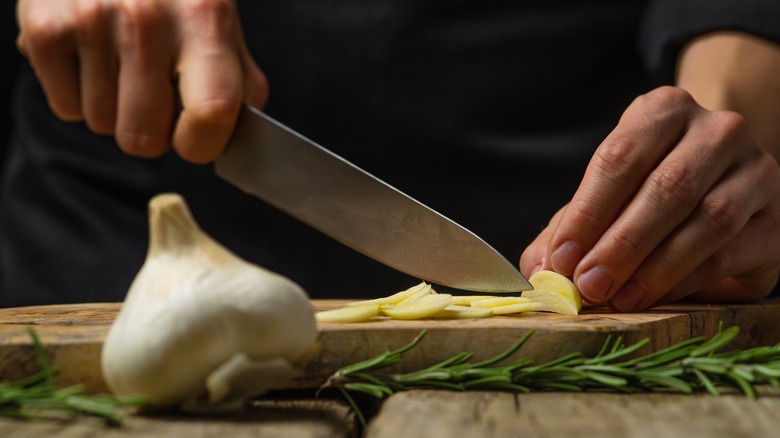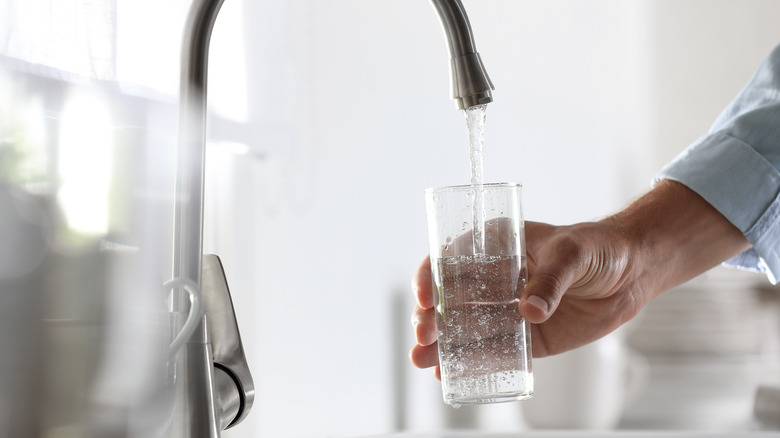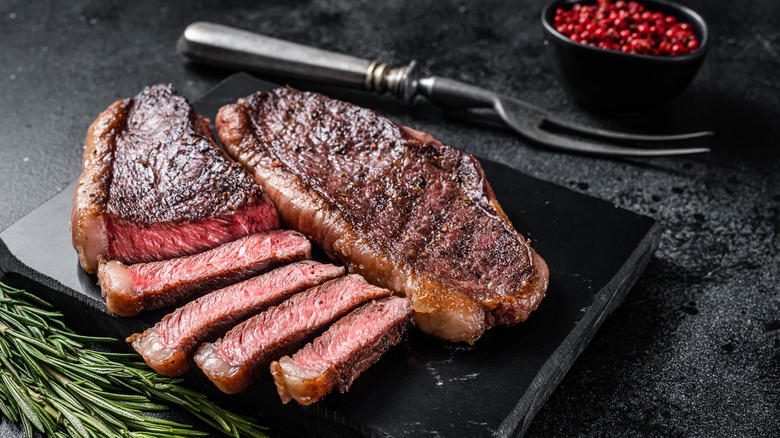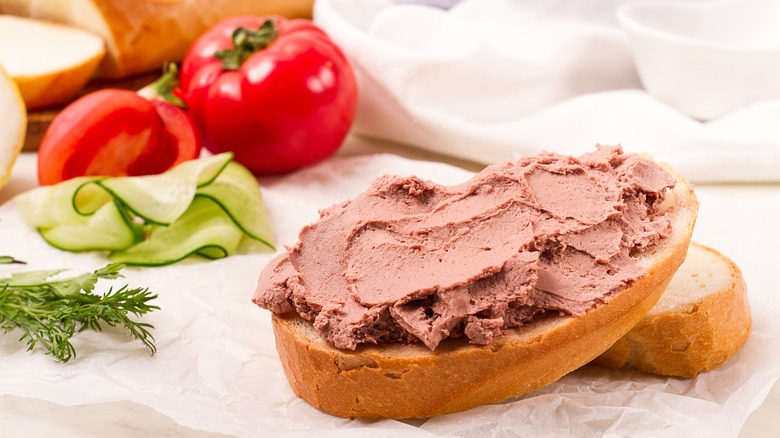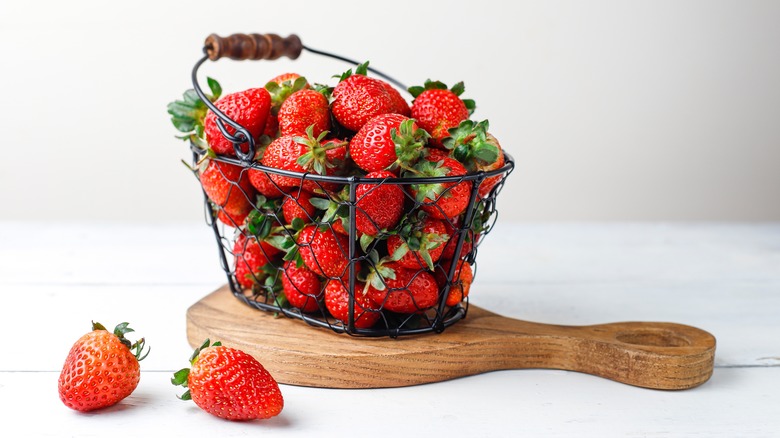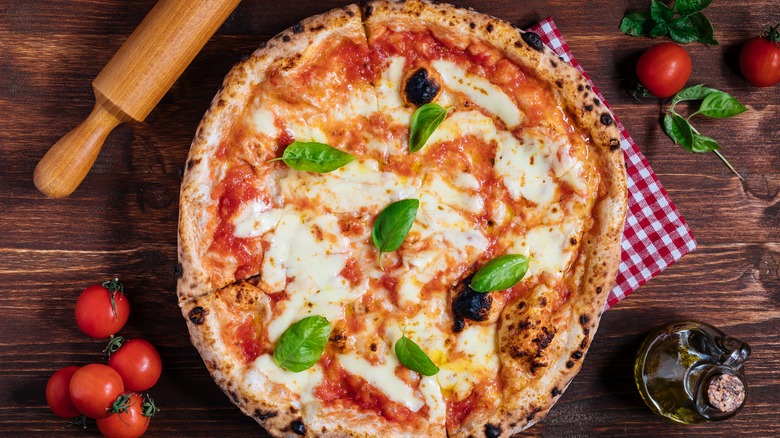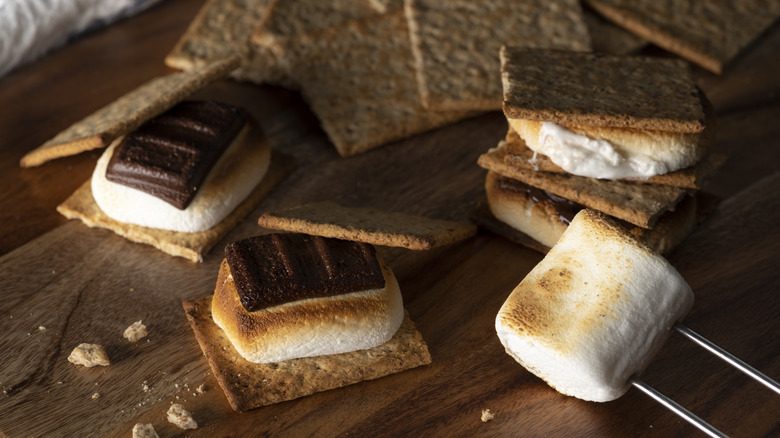Foods The Royals Never Eat
If you were a British royal with access to the most delectable, exotic spreads sourced from any culinary culture in the world, what would you feast on first? Before you let your imagination run wild, you should probably know that your food would go through a number of regulatory checks before you'd be able to dig in. Yup, that's a royal reality check for you! The British royal family's luxurious status compels them to miss out on some smaller pleasures of life. Like garlic, which is out-of-bounds for the monarchy, as are many other foodstuffs.
With royals who have to uphold both health and image, little is left to chance. Shellfish is another no-no — and for good reason. "It is a very sensible move to abandon having seafood when out and about on public duties," according to ex-royal butler Grant Harrold, who notes that a royal can't afford to fall sick, especially when traveling abroad (via Express).
When it comes to personal taste, all royal palates diverge. While Queen Elizabeth II wasn't a fan of garlic, she had a notoriously sweet spot for chocolate: "The queen was definitely a chocoholic, she loves dark chocolate," her personal royal chef Darren McGrady revealed (via Coffee Friend). And while pastas and pizzas were never on her menu, her younger successors — including her grandson Prince Harry and great-granddaughter Princess Charlotte — are known to have a taste for Italian cuisine. Read on to know what's not on the royal menu.
Pasta
It's rather impossible to reconcile the thought of the queen of England slurping down a string of spaghetti as the tomato sauce gets everywhere. That goofy image may be hard to conceptualize because it actually doesn't exist at all! The late Queen Elizabeth II wasn't a fan of starchy foods like pasta.
The dish didn't make it to the royal table when she dined alone. Royal chef Darren McGrady revealed to The Telegraph that the queen was a very disciplined eater. "No starch is the rule. No potatoes, rice, or pasta for dinner." She kept things simple, preferring healthy meats and salads to other popular foods. While her British etiquette would have doubtless qualified the queen for a clean pasta-eating experience, she altogether avoided the prospect of being "messy," according to McGrady (via GoodTo).
The queen's dietary choices didn't rein in her family's hunger for pasta. Despite her mother-in-law's no-pasta rule, Catherine, Princess of Wales, is more than happy to let her children indulge — and occasionally join them, too! "One stirs the flour, one puts the milk and butter in," Catherine once revealed about the process of cooking pasta with her tots (via Express). Princess Charlotte even prepared batches of the dish to be donated on her fifth birthday (per Hello!).
Shellfish (especially oysters)
Being who they are, the British royals are guarded against sickness on all fronts. That's why shellfish is more or less out of bounds for working members of the monarchy. This family of seafood — including oysters, crab, shrimp, and lobster — carries a risk of contamination and, as a consequence, could leave its consumer with an upset tummy. As noted by Time, some shellfish are also prone to a buildup of heavy metals that are unsafe to ingest.
Advising royals against eating shellfish seems to be a precautionary measure to preserve health. "We don't want a member of the royal family having a serious reaction to food poisoning. Especially if she is on an overseas tour," said Grant Harrold, former butler to King Charles III (via Express).
Oysters, in particular, are said to be a royal turnoff. According to a memoir by palace staff member Charles Oliver, the late Queen Elizabeth II and Prince Philip detested this variety of shellfish (per Reader's Digest). However, other royals haven't really been sticklers for the no-shellfish decree — including their son. In 2013, King Charles visited the Whitstable Oyster Festival and slurped down two oysters, polishing off his audacious feat by bravely remarking, "They are an acquired taste" (via BBC).
Potatoes
Is it even a meal if there are no potatoes on the plate? This versatile spud is believed to have been disfavored by Britain's former royal head Queen Elizabeth II on her daily menu. Darren McGrady, who worked at Buckingham's kitchens for 15 years, revealed that the late monarch preferred if there were no starches on the dinner table.
"The queen's not really bothered about food," McGrady revealed, noting that she wasn't really a foodie (via CNN). She ate to sustain herself, which was one of the secrets to her robust health. Her son King Charles III, meanwhile, is quite the potato connoisseur and recognizes the worth of well-prepared potatoes accompanying a Sunday roast (per The Telegraph).
It appears that the queen didn't begrudge potatoes, but merely restricted herself to enjoying them on special occasions. In fact, one of her favorite meals was venison served with parsnips, carrots, and potatoes — and if it was harvested from Balmoral, the better (per YouTube). "All of the dishes were rich in cream and butter and fat. Calories didn't really matter," McGrady told Delish while preparing creamy mashed potatoes the way the queen liked them. To avoid throwing her off potatoes even further, the presentation was kept paramount, and spuds were measured for uniform size before being plated (per Reader's Digest).
Garlic
Some believe you can never add too many garlic cloves while cooking. Unfortunately, the British royals are no garlic aficionados. On the royal menu of no-can-do foods, this pungent ingredient ranks near the very top. Given their jobs, which involve getting up close and personal with the most important global dignitaries and masses of people, the British royals cannot risk having what is called "garlic breath." Queen Elizabeth II's chef John Higgins testified that the monarchy is "missing out on garlic because at Buckingham Palace you don't cook with garlic. I suppose, in case you get the royal burp" (via National Post). Onion, another odorous culprit, is also a rare ingredient in royal kitchens.
Camilla, queen consort, admitted the no-garlic rule was in effect at the palace during her appearance on the cooking show "MasterChef Australia." When asked which foods were off-limits for the royals, she replied, "I hate to say this, but garlic" (via Marie Claire). Reservations about the flavorful ingredient also apparently stemmed from the late queen's personal distaste for it. According to the BBC, the queen's edict about garlic was forwarded to Italy ahead of one trip. Spaghetti, Italy's pièce de résistance, was also on the list of foods Italian chefs were told to steer clear of — a travesty, we know!
Tap water
The royal family is pretty picky when it comes to the kind of water they drink. And the reasons behind it are rather clear — as clear as pure filtered water, not tap water. They prefer carrying their own bottled water, especially when traveling outside of the homeland, for health reasons.
Drinking tap water is a common practice across the world, including in the United States, Canada, and even the United Kingdom. But many countries still struggle with access to sanitation — in fact, in several countries under the Commonwealth presided over by the British monarch, less than 90% of the population has access to clean drinking water (per Commonwealth Network). Meanwhile, regular testing and regulations render British tap water very safe to drink and also super fresh. For the kingdom, perhaps, but evidently not enough for the king's family.
The British royals' supply comes straight from Hildon Natural Mineral Water, a company in Hampshire whose estates are rooted deep in British history going back to the 17th century, according to the brand's website. Its prestige is certified by the royal warrant it holds, which "is granted to producers who have supplied to one of three royal households for no less than five in seven consecutive years" (via Hildon Natural Mineral Water). If you ever find yourself thirsting for an elixir fit for royalty, you'll have to shell out $5 to get your hands on a bottle of Hildon (per Food Network).
Rare meat
"Cook it rare," said the royal — never. Members of the British royal family are reportedly advised not to take their meats rare, owing to the possible health risks that accompany this food choice, especially when they're traveling outside the United Kingdom (per The Sun). The preparation of a rare steak is perceptibly close to its raw form — and consuming the latter is an invitation for salmonella or E. coli poisoning. While many across the globe prefer a rare steak to well-done meat, the final verdict on its safety is disputed. The United States Department of Agriculture recommends against eating undercooked meat, suggesting a minimum internal roast temperature of 145 degrees Fahrenheit.
Queen Elizabeth II was particular about opting for a well-done steak — a food preference that surprised even royal chefs. Well-done steak is known for its tough, chewy texture. "Chefs, we cook medium-rare all the time," former palace chef Darren McGrady told Delish (via YouTube). She liked venison. "So it was really, really important that we got a really good sear on the steaks and cooked her steak well done."
Prince William has followed in his family's footsteps of relishing a good steak, but his choice of preparation differs from his grandmother's (via People). "I like it medium-rare. I like it quite alive," he said, revealing that he enjoys cooking it himself, too.
Foie gras
Long before assuming his role as the British monarch, King Charles III was tightening the screws on the royal menu. Back in 2008, the then-Prince of Wales banned foie gras from royal dinner tables. According to Daily Mail, chefs at all royal residences were prohibited from buying or serving the controversial preparation.
Foie gras, a French delicacy that translates to "fat liver," has been mired in debate over its ethicality. Animal welfare activists argue that the process of producing this luxury food — which entails force-feeding a duck or goose to retrieve fatty liver, per The Guardian — is cruel, an opinion the king seems to agree with. It is believed that his daughter-in-law Catherine, Princess of Wales, takes a certain fancy to the dish.
While British law does not allow the production of foie gras in the country, Animal Equality UK observes that no law prevents the item from being imported or sold. So while "the menus at Buckingham Palace are very traditional French," according to former Buckingham kitchen staff, this particular fare is shunned (via Insider). The king is known for his preference for a climatarian diet that prioritizes the health of nature over your taste buds. Though his diet accommodates both meat and plant-based food, he consciously opts for preparations that reduce his carbon footprint (per Express).
Out-of-season fruits
Queen Elizabeth II loved natural goodies. And like a fruit fanatic worth her salt, she was extremely knowledgeable and fussy about enjoying the right kind of fruit in the right season. The late monarch relished strawberries. Her favorite variety came from Balmoral, being turned into jam and preserves and every delicious whatnot. When she had time, she picked the fruit out herself, too. "The queen would relax by going strawberry picking and come back with a basket of berries for me to prepare in the kitchen," her personal chef Darren McGrady told Vanity Fair, adding that she liked her strawberries paired with chocolate — a lifelong beloved treat.
But, God forbid, if one were to offer her strawberries out of season, it was nothing short of an abomination. The queen would send them back with a warning (per Express). GMO fruits? That's a royal nope. It's no coincidence that Wimbledon, where the classic strawberries and cream dessert is an old tradition, falls during strawberry season!
You'd best believe that someone who took their strawberry-eating seriously would extend the same courtesy to other seasonal fruits. Peaches and mangoes were other choice favorites of the queen, per her former staff. "She could tell you how many mangoes were in the fridge at Buckingham Palace," ex-royal chef John Higgins said (via National Post).
Pizza
Just one pizza slice, and you're in heaven. Queen Elizabeth II didn't seem to think so, since this beloved Italian dish was never on the table at Buckingham during her time. "Eleven years at the palace and we never served pizza at all, not even at receptions," Darren McGrady, former royal chef, told Insider.
The late monarch was a stickler for her no-starch rule, especially at dinnertime, when she avoided bread varieties. The palace's elegant menus could not afford to have pizza — with its "messy" tomato sauce — disturb a fine dining experience (per BBC). Moreover, Victorian etiquette dictated that hand-held foods only be reserved for afternoon tea.
Whether or not the queen indulged in this globally loved, soul-satisfying delicacy was a mystery even to her daughter-in-law Catherine, Princess of Wales. When students asked about it at an event in 2019, Catherine replied, "That's a good question. I don't know. Maybe next time I see her, should I ask?" (via W Magazine). Kate, for her part, enjoys bacon on her pizza, while her husband William apparently savors an Indian chicken tikka twist on his dough (per Us Weekly). Though McGrady never fired up the wood ovens at Buckingham, he recalled making pizza "all the time for William" when he was a young boy at Kensington Palace. We can only hope the queen tasted a slice in her lifetime!
S'mores
Prince Harry's palate is rather American when it comes to enjoying hamburgers. The Brit, who stepped back from royal duties in 2020 with his wife Meghan Markle and moved to her home country, doesn't count the calories with his favorite grub. The staff at an In-N-Out Burger the couple frequents in California even knows his order by heart, which is "two double-doubles, animal style, fries, and a Coke!" he told People.
He doesn't share this enthusiasm for another American classic, though: s'mores. The young royal isn't particularly a fan of toasty marshmallows – a staple campfire tradition that Markle probably grew up with. "I've never toasted marshmallows over a campfire," he said in 2017 (via Today). "They're too sweet for me."
While he did admit to having had his fair share of camping experiences, his dislike of s'mores prompted a collective gasp to resound across the United States. The revelation even earned him two golden tickets from Peeps, a leading marshmallow brand, to visit their factory and "embrace this true American tradition" (via The Los Angeles Times). Prince Harry would much rather satiate his sweet tooth with traditional desserts from his homeland, such as the classic treacle tart or banana flan. The latter was a childhood favorite of his and his brother's (per YouTube). Chef Darren McGrady ensured that the kitchens had banana flan ready whenever the royal brothers came home from school.
